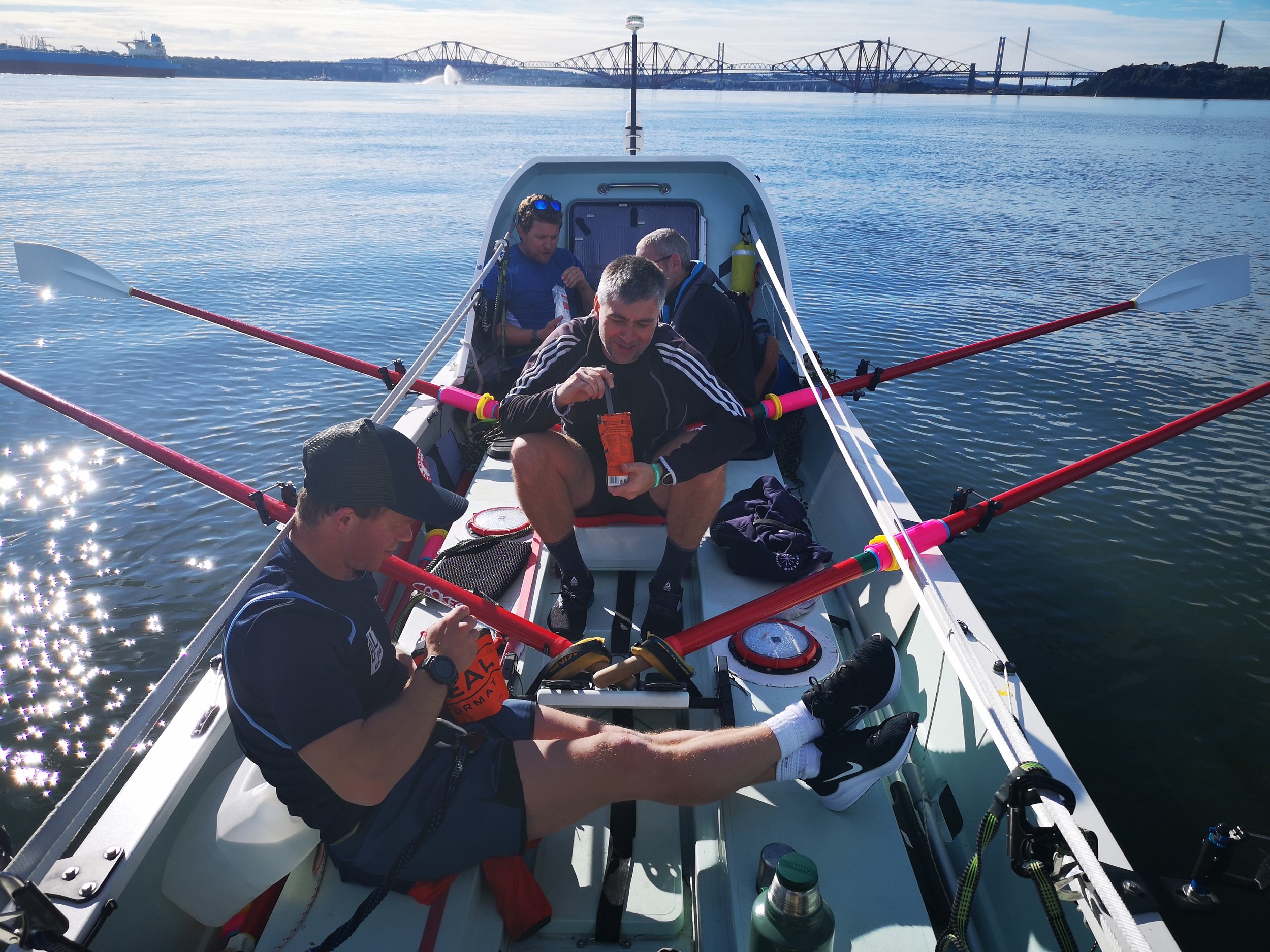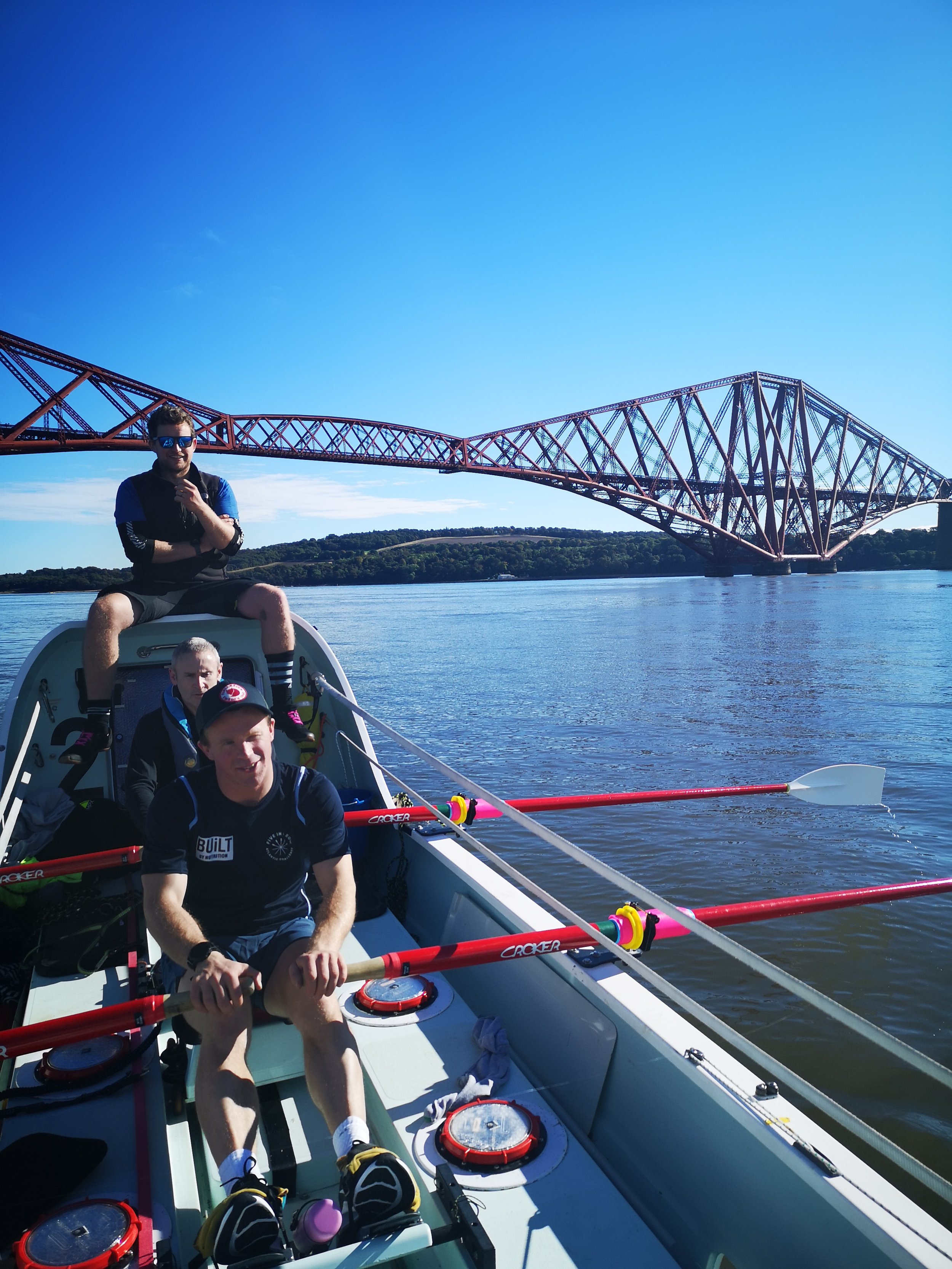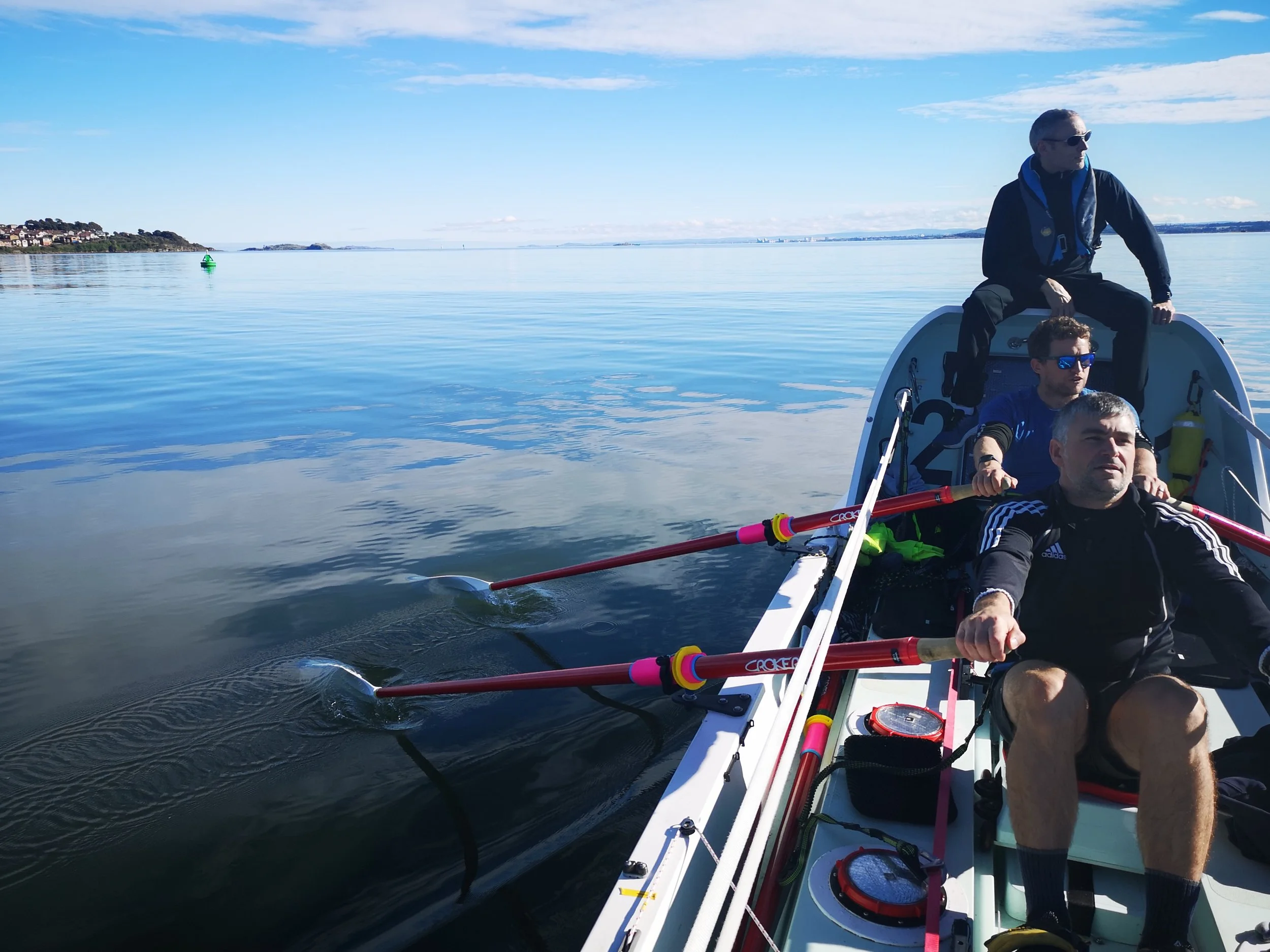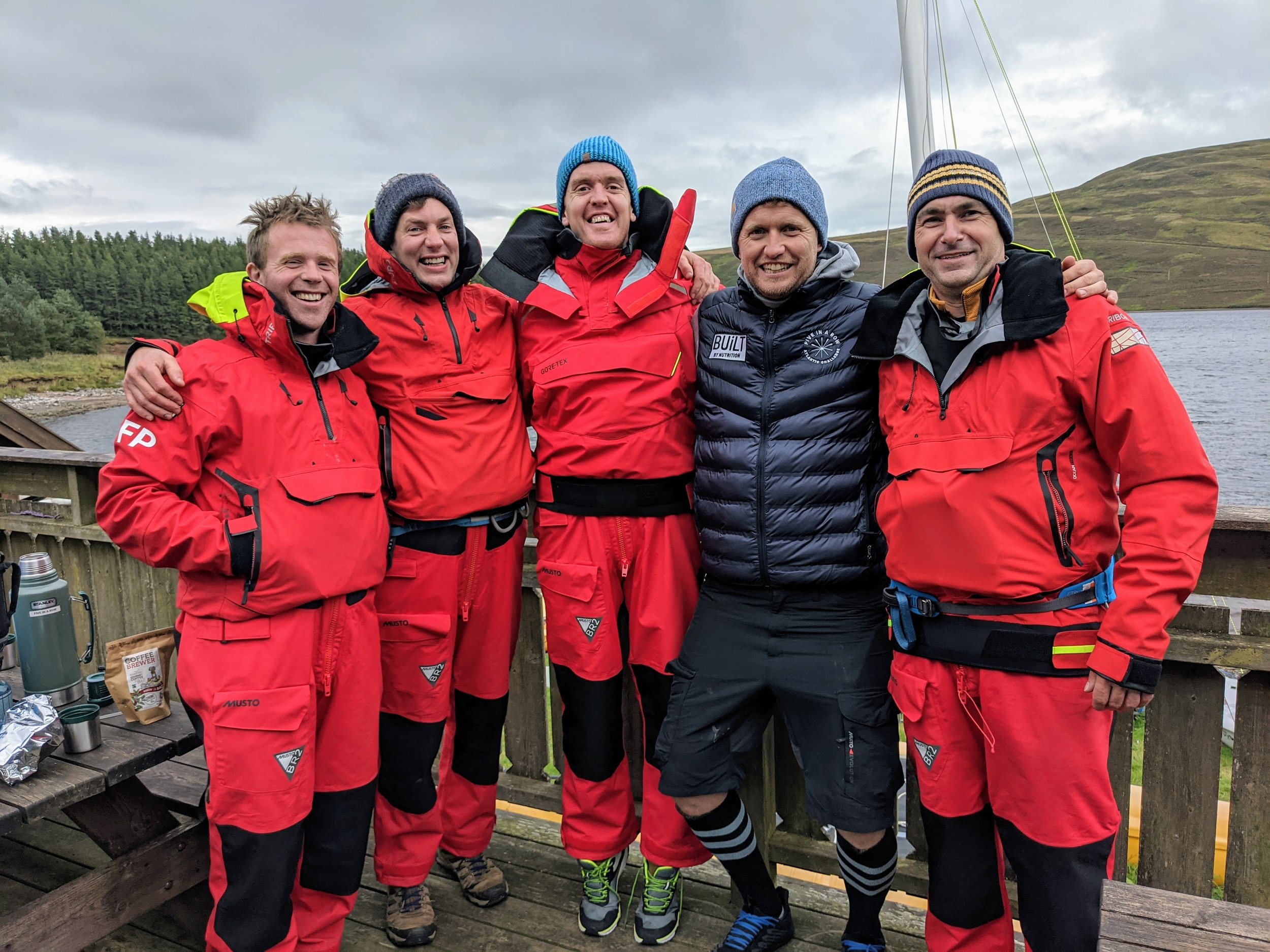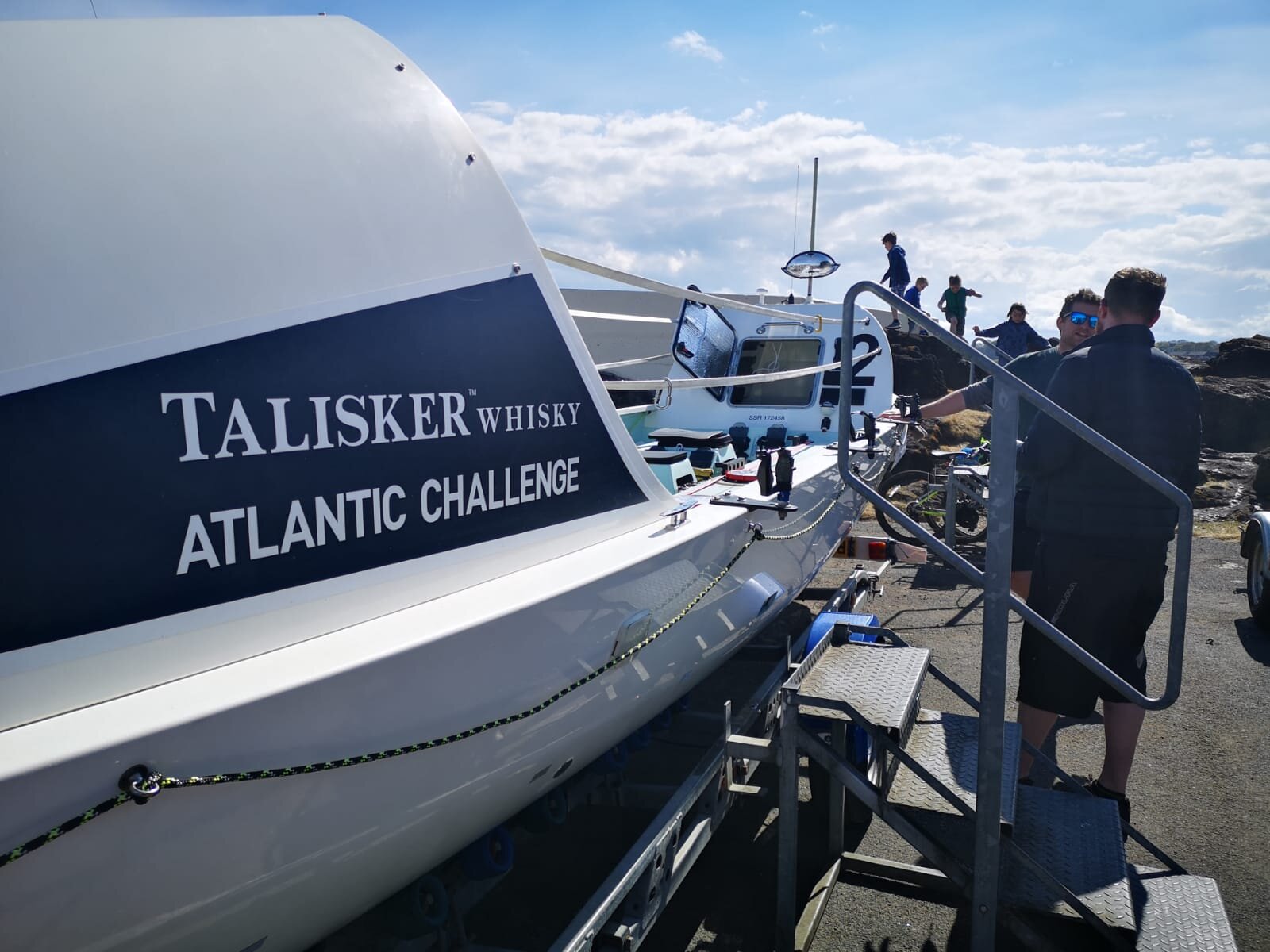Time and Tide
The Scotsman, Nov 2021
Time and tide wait for no man. Chaucer said that, more than half a millennium ago, and it’s still true today. Particularly if you’re the one towing the boat, and you get a flat tyre on the way to the harbour. It’s eleven AM now. Had all gone to plan, Five in a Row would be skimming east across the Forth, gathering up some final training hours on a last cold-water run before being carefully packed and shipped to La Gomera, and the start line of the 2021 Talisker Atlantic Challenge. But it didn’t, and she’s not. Instead, boat and crew are poised on Port Edgar’s weedy slipway, where they have been waiting, for four hours.
Perennially cheerful skipper Duncan Hughes pokes his head out of the cabin, where he and Fraser Potter are making some last-minute adjustments, explaining away the delay with characteristic humour. From inside, there’s a loud banging and a piece of something crucial looking is tossed out onto the deck. “Weight-saving,” says Fraser, as he ducks back inside. Ross grins, Duncan giggles, and I am struck once again by the warm spirit of camaraderie that fortifies this close-knit team.
It’s been nearly four months since I last visited Ross McKinny, Fraser Potter, Clive Rooney, Ian Baird, and Duncan Hughes: Scotland’s only crew in this year’s trans-Atlantic race. Back in June, thanks to social distancing, they had yet even to sit in the boat together, let alone to scull her out on the water. But thankfully things have changed, and from the looks of their shoulders they’ve been taking the training seriously. All look formidably sturdy–and they’ll need to be. In December, they’ll be joining teams ranging from soloists to quintets, competing to pull themselves, unsupported, through three-thousand treacherous miles of open ocean, from the Canaries to the West Indies, against the clock and the forces of nature, for charity, pride, and the sheer bloody love of adventure–in what is dubbed by the organisers, the world’s toughest row.
By noon, the water’s high enough to launch safely. A fat 4x4 reverses into the murky flood tide, straps are released, and the craft shimmies free of her cradling trailer, floating gracefully out into the harbour. Fraser and Ross are already aboard, but with Clive and Ian unavailable today, I’m making up the numbers with another Cal; a svelte and steely-eyed rower whose crew have designs on buying the boat for the 2022 event. He looks powerfully familiar (later we’ll discover he is renowned actor Cal MacAninch) and as we walk together down the pontoon, I simply have to ask him why. Why would you want to put yourself through this? For the adventure, the challenge?
“The challenge, yes, and the charity” he says, in a precise Glaswegian burr. “And for my kids…to show them that anything is possible if you put your mind to it.”
With the boat alongside we leap on deck, rocking and lurching as everyone finds their positions, clipping into safety harnesses and perching as best we can as gear is stowed and oars are thrust out. What little space not given over to sliding rowers’ seats is awkward and utilitarian. Scant comfort can be found by leaning against the cabins. The sort of comfort generally associated with snuggling up to the luggage racks on cramped commuter trains. It’s rather like crouching in a very compact, very narrow minibus, with the wheels and seats removed and the bodywork cut away entirely a foot above floor level, bobbing around in the sea. (And if you’re trying to imagine it, can I suggest you don’t let your mind run to the five pitiless miles of ocean beneath you, or the thousand miles of it in front of you, or that you’ll be here for another month without a wash.)
“Backing, to starboard” shouts Ross, pushing away from the pontoon. And as we’re leaving the shelter of the harbour, it seems an opportune moment to enquire about navigation. “So is the plan just to row in as direct a line as possible, or do you all take different routes?” Ross, who is propped next to me, working the rudder with two long strings, answers in a gentle voice, “Pretty much. But it’s very weather dependent. We’ve an experienced weather-router on land, Stewart Robertson, who’ll be keeping track of us and helping to plot our course as we go, so it’s hard to predict accurately ahead of time. Some crews may head further out, to avoid bad weather, or find favourable winds. Wind can be a big help, but it can also be the enemy–the difference between a fast year and a slow, for everyone. We’ve a parachute anchor on board in case it gets really bad. Throw it out, should slow our backward drift a bit. At least that’s the theory.” As Fraser and Cal haul us bodily eastwards towards the sprawling red arcs of the Forth Bridge, I dwell for a moment on the heartbreak of watching your progress slip away, and shiver.
Just off Inverkeithing there is a change of personnel. Cal switches out with Duncan and hops up onto the cabin roof. The boat rolls heavily as they shift, and though it’s calm and we’ve no daggerboard out, it strikes me again just how keenly every movement will be felt out there by the whole crew. And that as tiredness creeps in and patience inevitably frays, the emotional, social demands of the race may become every bit as challenging as the physical.
“We’ve been lucky to work with an amazing performance psychologist” Duncan shouts across, to allay my concerns. “Katie Warriner. She works with Olympians, world champions,” he shakes his head, “different level. She’s built personal plans for us. Resilience, focus, communication. It’s really helped.”
I hope so.
We’ve been going a while, at what feels a decent clip, so I ask the obvious question: how long? “Well, the record is thirty-five days” says Duncan, sliding and pulling, sliding and pulling, “and if you’d asked me back in June, I’d have said thirty-five days. But now…look, I’ll be happy if I feel we’ve all pulled our hardest, done our best, even if it’s forty.”
“And Clive?” I ask, remembering that of all the crew, he is famously the most competitive.
“Thirty-four” the three of them reply in unison. And as if to punctuate their thought, Ross’s phone pings. It’s Clive, having somehow remotely tapped into the GPS and availed himself of our speed. Message reads: “Only three knots?! Dig in boys, come on!”
After lunch–fruit tea and a surprisingly tasty sachet of freeze-dried reindeer stew–it is, at last, my turn. “Follow the man in front” they tell me. “Just ignore all this water and keep your eyes on Ross’s back.” So I pull and slide, pull and slide, feeling the propulsion, but quickly feeling the effect in my lower back, too. A thousand hours of this? “Heels down, nipples up!” comes a shout from the boys. “Watch that form!”
I want to ask more about expectations, hopes. To dig further into their feelings as the starting line looms after so long in preparation. How they think they will react, what they may learn about themselves, and what fate might have in store. “So…” I begin, losing my rhythm, and clattering my oars into Ross’s. This time there is a different cry: “High Five!”
And perhaps they are better left unasked. After all, finding the answers to those questions is precisely what make this adventure so enticing to these brave men. That, and the promise of showing their children–and themselves–what’s possible if you really put your mind to it.
Five men. Six oars. 3000 miles
It all begins with an idea.
The Scotsman, July 2021
It speaks volumes about the British obsession with a particular brand of humour that, despite the vast stretches of open sea, muscular thirty-foot Atlantic swells, sunburn, sores, sleep-deprivation, seasickness and suffering (lots and lots of suffering) that awaits the strapping lads showing us around their shiny new boat, what most people seem really, forensically interested in is not the buttock-clenchingly gruelling thought of propelling a fiberglass capsule no larger than a transit van one-and-a-half million oar strokes across an inhospitable ocean. It is the facilities. Or rather, the distinct lack thereof. So let’s get this out of the way early shall we.
It’s yellow and it’s plastic and it has, for my money, the easiest gig on the boat.
The Talisker Whisky Atlantic Challenge is billed as the world’s toughest row. In early December, crew members from around thirty global teams will cast off from San Sebastián de La Gomera on the coast of Spain’s Canary Islands, sculling for two hours then sleeping for two, on constant twenty-four-hour rotation, for between forty and one hundred days, until they reach Nelson’s Dockyard English Harbour in Antigua some three thousand miles West. Hopefully, in first place. They will carry (or desalinate) everything they need to sustain them on their journey, sleep and wait out bad weather folded into one of the boat’s two cramped cabins (cabins that, for buoyancy reasons, must be sealed shut whenever they are in use) and will, on occasion, be bobbing around atop a body of water that is over five miles deep. And I know that sounds like a lot of fun, but as I discovered when I visited the only Scottish crew in this year’s race (Five in a Row) at North Berwick harbour this bright morning, for them there is a deeper and far more personal reason behind this particularly flagellant pleasure cruise.
Rett Syndrome is a rare post-natal neurological disorder that affects brain development in children, resulting in severe and destructive mental and physical disabilities. Speaking, walking, eating, even breathing is impacted, whilst the parts of the brain that control consciousness and awareness remain largely undamaged, often locking young minds into young bodies they cannot control. In a particularly ugly twist, Rett is disproportionately fond of little girls. It is, and I choose this word carefully: heartbreaking. There is no known cure, at least not yet, but what can be managed is the health and wellbeing of the children and the families who suffer, as treatments, therapies, and hopefully a cure are developed. Ross McKinney, one of the five crew members putting the juniors of the North Berwick rowing club through their paces on the rowing machine, has a young daughter, Eliza, who suffers from Rett. Reverse Rett is the charity for whom the team are raising both money and awareness.
‘If it looks like a mid-life crisis and sounds like a mid-life crisis…’ Duncan Hughes is a head and shoulder taller than the rest of the crew; tanned, team-spirited, and terminally optimistic (and half a lifetime ago we went to school together). He doesn’t get a chance to finish his thought though, as one of his three young boys bounds up, tugging impatiently at his shorts. ‘We know you have money for ice cream!’
His ‘nope’ is accompanied by warm laughter and punctuated with a kick to the rear that sends the boy skittering and giggling away onto the beach. (They will try again three times in the next thirty minutes, using a variety of tactics, and eventually, sorry Hannah, they will wear him down.)
When the two of us were boys ourselves, some twenty-five years ago, Duncan was a vegetarian, as he still is today. This was a rare thing for a thirteen-year-old rugby player in East Lothian, and something he decided for himself was important — a fact I did not know until this moment.
‘Imagine a rugby club dinner where you are the only vegetarian. A lukewarm Linda McCartney lasagne being slow clapped in on a silver platter in front of the entire bar, and then a bill for forty quid!’ And yet it is a feature of the man that this, for him, is a fond and entertaining memory. I suspect this stands him, and his associates, in good stead for dealing philosophically with two months of his cacophonous dehydrated mung bean emissions. Which brings us smoothly to food. How, on earth, to feed five calorifically deficient rowers for ten ravenous weeks, with no fridge, cooker, sink, utensils, or support?
‘Freeze dried…it’s pretty good actually’ says Ian Baird, another of the crew, as he throws me a crinkled foil brick. A good thing too, as they’re going to have to eat a hell of a lot of it. Each man will need to consume approximately ten thousand calories, and around ten litres of water per day (which, if the solar powered desalinator fails, will need to be hand pumped; an agonising and laborious process). The hold will be packed — literally, to the gunwales — with vacuum sealed silver sachets of the stuff: protein, carbohydrate, sugar…and noisome arguments in waiting.
‘You eat the first thing you grab, and to begin with it’ll be jammed into the cabins too. We’ll have to squeeze in there with it until we’ve chomped our way through it!’ Adds Ian, gleefully.
The trip itself does not weigh anchor for some two hundred days, but already the crew are pushing themselves with punishing, and of course often socially distanced training, including brutal sets of two hours on - one hour off - two hours on (and if you’ve ever used a rowing machine I defy you not to wince at the very idea of that) as well as regular sponsorship rallying; glad-handing with everyone from sea scouts to venture capitalists. And no wonder, because it’s an expensive business. The boat itself costs in the mid five-figures, and that doesn’t begin to account for the entry fees, food, equipment, or the logistics of actually transporting crew and craft to the Canaries.
In an effort to broach the sensitive subject of finance, I ask Duncan how they found the boat. Surely, I thought, there must be no shortage of jaded, tattered-bottomed adventurers just desperate to get shot of the bloody things? But apparently not.
‘Hen’s teeth. We hunted and hunted, then one day I recognised three guys on the beach eating fish suppers. The Maclean brothers: Scottish ocean rowers, record-breakers. I ran over, got to talking with them and offered to buy their boat…they said yes, and we’ve had three offers for it already.’
So, the boat is expensive, and the accommodations cramped (and stifling, and windowless). The physical challenge is unrelentingly arduous, and the food is a little samey. You make the water yourself, puke yourself blind (did I mention that?) torture your bottom and relieve the monotony by jamming it into a bucket. Nonetheless, the lot of them look energised, elated, primed…near giddy with the thought of testing themselves, of doing something outside of the normal sphere of existence. But perhaps that is because there is more at stake here than just adventure, machismo, and a near palpable competitive spirit.
Perhaps that is because of Eliza.
Follow thier progress or support the team here: https://www.fiveinarow.co.uk/personal

